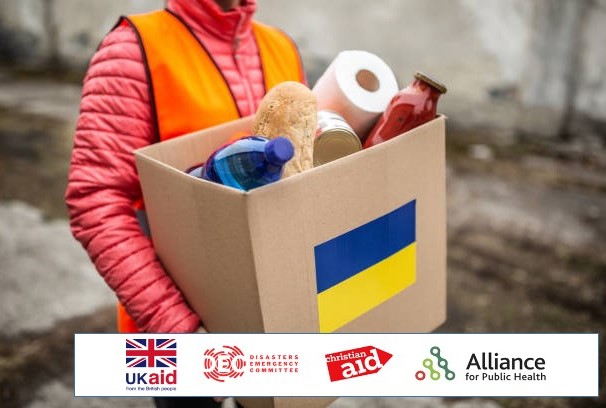We have been fighting for our land, independence, and freedom for over a year and a half. The Russian invasion of Ukraine has caused many critical situations for our society, such as damage to civil infrastructure, energy systems, government and military buildings, medical, educational, and social institutions etc. Thousands of people lost their homes, jobs, documents, and relatives and were forced to start their lives from the beginning in a new place both within the country and abroad.
“Our village was on the line of hostilities, so we constantly suffered heavy shelling from heavy weapons. It was always terrifying because the Russians placed the equipment right before our house. Once, we asked the Russian military to go to a nearby street to get milk (we always had to tell where we were going), and just then, the shelling started. We immediately hid in the cellar, and our house was already on fire. The house was completely gone in the evening,” recalls Oleksandr Mykhailovych, Shestovitsia, Chernihivka Oblast.
Women feel a double burden of responsibility, both for their own lives and for their children’s lives, peace, and health. Many women were forced to leave everything to save the future generation of Ukrainians. In war conditions, children suffer many times more due to the deterioration of their psychological state, loss of already acquired skills, friendships, and family ties, lack of access to safe places, and sometimes even adequate food and water. It is tough now for mothers who have children with special needs because they are one of the most vulnerable categories of the population and need more attention and care.
“Psychological correctional assistance is needed not only for children with special educational needs but also for those children who have experienced stressful situations. Such children include the majority of displaced children who came to a new area from the occupied territories or war zones,” noted the specialists of the “FIDES” Psychological Center, who organized a safe space in March 2022, where during the year, psychological and correctional services 120 children are provided free of charge.
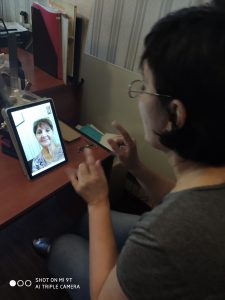 People with hearing impairments face fewer problems during the war because getting the necessary help is tough. After all, there are almost always problems with translation into sign language.
People with hearing impairments face fewer problems during the war because getting the necessary help is tough. After all, there are almost always problems with translation into sign language.
“My husband and I are pensioners; we moved to Dnipro from Bakhmut. Our home is destroyed, and starting over at 73 is difficult, especially if you have health problems. Now, we rent a house and spend almost all the money on paying for the house. In humanitarian aid, we received a tablet with a translator. Now, we can receive remote assistance in translation into Ukrainian sign language, which greatly facilitates our communication with the world around us. When you find yourself in such a difficult situation at our age and cannot ask for help because you are not understood, or you do not understand – this translator becomes the only hope and support”, says 73-year-old Tetiana, IDP.
In general, all Ukrainians, to one degree or another, faced various challenges and needed or needed help. Sensing the need of Ukrainians, the ICF “Alliance for Public Health” and its 26 regional partners managed to quickly and effectively mobilize their forces and deploy humanitarian activities in almost all regions of Ukraine except the occupied territories in the first months of the war. This became possible with the significant financial support of the British Disasters Emergency Committee (DEC) and the robust technical assistance of the British charity organization Christian Aid.
As part of humanitarian activities, humanitarian aid kits are distributed to people, such as food and hygiene products, household chemicals or certificates for purchasing goods in supermarket chains, and certificates for buying medicines in pharmacies. Also, baby food sets, diapers, and other necessary goods are provided for children. Maximizing access to medical, psychological, and legal counseling, social support, and/or referral to partner organizations and specialized institutions (healthcare institutions, legal agencies, social assistance centers, etc.) became a significant and desired work direction. In NGO offices, shelters, modular towns for IDPs, and volunteer centers based on mobile dispensaries and train stations, in remote united territorial communities and regional city centers, experienced specialists work with people to solve their war-related problems.
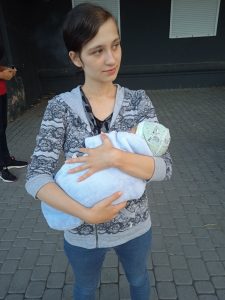
- Evacuation and comprehensive advisory assistance
A young single mother, Alina was evacuated from Sloviansk to Dnipro with her newborn daughter. The woman was left alone with the child and needed support. Due to the war, young age, difficult situation, and the loss of her passport, the girl had neither the means to live on nor the ability to issue child benefits and assistance for IDPs. Alina was provided with specialist consultations, free accommodation, and meals in a shelter for three days, after which she and her daughter were transported to Kazatyn, Vinnytska Oblast, for further residence. Currently, she and her child are in a safe place, provided with free temporary housing and everything they need for living.
- Psychological assistance
“I turned to a charitable organization for help, stating that I needed psychological support. The center’s psychologist invited me to a consultation, and later, I started visiting her regularly, although I had never been to a psychologist before. Thanks to the interaction with the psychologist, it is easier for me to coordinate myself in various life circumstances, and my relationship with my children has also improved,” says Alla, a resident of Severodonetsk, who was forced to flee from the war.
Now the woman’s psycho-emotional state has significantly improved, she often participates in charity events, including as a volunteer.
- Medical and social assistance
“Treatment had to be postponed all the time: as a mother, I always worried about the children’s health first, and then about my own, if there was time and resources. Thanks to the humanitarian project, I received help and support through the necessary medication advice from a social worker on dealing with stress and employment. Currently, I have great motivation for employment; I am purposefully looking for a job; I go to interviews,” says 43-year-old Svitlana, a client of the OST program, Poltavska Oblast. – “I want to express my gratitude to everyone who responded to my request for help. Now, I feel relieved because the treatment has started, which is the most important thing. I am sure I will continue it, my health will improve, and it will be much easier to work and provide for my children.”.
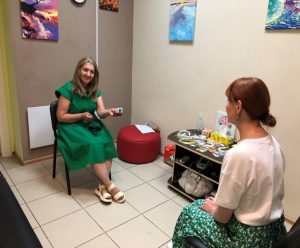
“It’s even scary to remember how I ran away from Kherson with my little daughter. That’s what we were in; that’s what we ran when the opportunity arose to free ourselves. There was no money at all, and luckily for us, the employees of a charitable organization helped us get settled in a shelter. The only thing I felt then was helplessness and despair. It seemed to me that life was over, and there was no future. I practically did not sleep and felt fear constantly,” says Nataliya, an IDP from Kherson. When the woman sought help from the СO “СF “Public Health”, she was provided with safe shelter and consultations with all the necessary specialists. During the entire stay at the top, the woman receives free food, medical treatment, and counseling from a lawyer and a psychologist. Now, she has started attending trainings organized for residents of the facility.
During the project’s year of operation, 218,718 people received assistance, including IDPs, families with children, people with disabilities, representatives of groups most vulnerable to HIV infection, etc. Among these, 18,903 people were provided with food, hygiene, children’s kits, and/or medicines/home first-aid kits, 9,046 people found shelter in safe places, and 2,624 received targeted financial assistance.
The project actively supported community initiatives – this is when solving problems in a specific community is undertaken by the residents of the community, who have rallied on their own. Such motivated initiative groups could participate in open competitions held in 16 regions of Ukraine and receive funding for a mini-project aimed at overcoming specific problems or meeting the needs of community residents.
“Thanks to the implementation of the project “Glove – a warm and safe overnight stay at a police checkpoint for the needy,” we managed to equip seven police checkpoints and create places for people to spend the night, which are equipped with generators, heaters, folding tables, benches, machines for hot drinks and chairs for a comfortable stay. This made it possible to help more than a hundred people who left the occupation and did not have a home, as well as those who, due to the lack of light, electricity, and heating, did not have the conditions to spend the night at home”, – shares the results of the work of the initiative group from the NGO “Melitopol Voluntary Group “PATRIOT” “, who won funding to set up seven “Points of Invincibility”, which operate 24 hours a day and are free of charge for the temporary stay of people evacuating from the occupied territories.
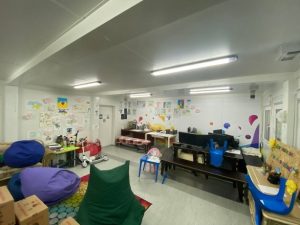 From September 1, 2022, to August 31, 2023, funding supported 199 mini-projects of initiative groups from 20 country regions. Mini-projects related to solving a wide variety of community problems: from repairs, arranging temporary shelters for IDPs, bomb shelters, children’s playgrounds and premises for groups, repairing communications, providing fuel, opening sewing workshops, public laundries, kitchens, bakeries, and educational, corrective, rehabilitation measures. The results of such initiatives are still gratefully used by 153,935 residents of various communities.
From September 1, 2022, to August 31, 2023, funding supported 199 mini-projects of initiative groups from 20 country regions. Mini-projects related to solving a wide variety of community problems: from repairs, arranging temporary shelters for IDPs, bomb shelters, children’s playgrounds and premises for groups, repairing communications, providing fuel, opening sewing workshops, public laundries, kitchens, bakeries, and educational, corrective, rehabilitation measures. The results of such initiatives are still gratefully used by 153,935 residents of various communities.
For example, an initiative group of residents of Zastugna, Kyivska Oblast, thanks to the victory in the mini-grant competition, was able to furnish the premises of the village center of culture with furniture and equipment for holding various children’s groups, master classes, and teaching children from several nearby villages. In addition, separate rooms were equipped with a medical office. It provides free medical services not only to residents of Zastugna but also to other villages. “Our initiative group takes care of the improvement of the village, constantly compiles lists of needs, discovers new problems that need to be solved, and sets ambitious goals. We are happy that in such a difficult time for the country, there are projects of social orientation that help improve the lives of underprivileged sections of the population,” says Tetiana Pasichnyk, the head of the village.
A recent real-time assessment conducted by the international faith-based organization ACT Alliance has shown that an approach involving people and initiative groups to solve the problems of their communities is a best practice to support and strengthen plans to localize humanitarian aid in Ukraine.
“During the project, we were able to make sure that micro-grants enable initiative groups to quickly meet urgent needs and use the various opportunities of their communities to solve pressing problems. All initiatives come exclusively from communities that know the situation better and see the most effective ways to overcome challenges. This confirms the individuality and importance of this approach. We witnessed countless vivid examples of local ideas aimed at quickly overcoming the consequences of the war in Ukraine. It’s time to even more actively support people who do not sit idly by, but solve problems with their efforts, involving their community”, – Marina Varban, Senior Manager of the humanitarian support program, ICF “Alliance for Public Health”.
Summing up the year of activities of the project “Integrated Humanitarian Response in the Conditions of War and Post-war Reconstruction”, we can say that it was a good start; we have overcome this path with dignity and helped thousands of needy people. We have become stronger and wiser. But there is still a lot of work ahead. A large part of this work will consist of creating opportunities for forming and developing local initiatives, ensuring the availability of resources and assistance in their effective use to support all who will need them.
To this end, the ICF ” Alliance for Public Health” will continue to provide sub-grants to regional partner NGOs and will regularly announce open mini-grant competitions on its website https://aph.org.ua/uk/tendery/programni-konkursy/
Additional Information:
For 23 years, the ICF ” Alliance for Public Health» team has been helping people gain access to the prevention, diagnosis, and treatment of HIV, hepatitis, and tuberculosis, protecting human rights, and providing humanitarian support. The organization has extensive experience in successfully implementing complex, large-scale interventions in all regions of Ukraine in fruitful cooperation with NGOs, key communities, state, communal, and private institutions, business structures, etc.

